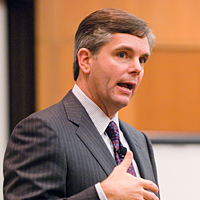| |
 |
| |
H.
Lawrence Culp Jr. Photo
© Nathan Mandell |
| |
|
| |
 |
| |
Arne
Duncan Photo
© Nathan Mandell |
| |
|
Kellogg
summit reveals leadership keys
Conference
attracts array of experts to exchange ideas, practices for
managing crisis
"The
Boeing Co. is a textbook example of how an entire company
can go into crisis by the misdeeds of a few," said Harry
S. McGee, vice president of finance and corporate controller
for Boeing, who was among several distinguished executives
sharing insights during the Kellogg School Leadership Conference
on Oct. 18.
The
annual student-run initiative drew hundreds of faculty, students,
alumni and guests for discussions including best practices
honed through challenging situations.
In
"Leadership Through Crisis," a panel moderated by
Kellogg Clinical Professor of Management and Strategy Harry
Kraemer, former CEO of Baxter International, McGee discussed
the ramifications of Boeing's 2002 hiring practices scandal.
In the scandal's aftermath, employee morale and public trust
in the company were weakened, and the company was forced to
pay more than $600 million in fines.
"Ethics
cannot be traded for performance," said McGee, who added
that Boeing discovered the breach of ethics and reported it
to the government, launching an investigation that later led
to charges for two and a conviction for one of the executives
involved. The scandal's lessons resulted in Boeing implementing
ethics training and code-of-conduct agreements.
Other
panelists included Professor Thomas E. Zelibor, dean
of the College of Naval Leadership, Naval War College, and
retired Rear Admiral for the U.S. Navy; and Patrick J.
Gnazzo, senior vice president, business practices, and
chief compliance officer for CA.
"Plan
for business continuity during crisis, know that you can't
do it all alone, and understand that you may need to step
aside to let crisis teams handle things," said Gnazzo.
Kraemer
said reflection helps leaders discover the values they will
apply in crises.
"Determine
what you think is right and ask yourself if your employees
know how you would react in a crisis," said the Kellogg
professor, who is also partner at Madison Dearborn.
In
one of two keynote addresses, H. Lawrence Culp Jr.,
president and CEO of Danaher Corp., shared lessons learned
through several senior executive roles.
"Leadership
is about seeing around corners," he said. "It's
about having integrity and vision, passion that inspires others,
and humility" — characteristics developed through
experience.
"It's
hard to learn leadership in an advisory role. You've got to
be out in the field ... where you have an opportunity to make
mistakes and learn what works," Culp said.
Also
important for leaders, he said, is understanding the distinction
between growing and winning, and ensuring that everyone in
the organization knows the expectations for winning.
"When
you're growing, it's very easy to think that you're winning.
But the numbers can lie," Culp said. "I'd rather
be up two in a flat market than be up 12 in a market that's
growing 15."
Another
leader mindful of statistical influence is Arne Duncan,
CEO of Chicago Public Schools (CPS), and the conference's
second keynote. He told attendees that when he assumed his
role in the 1980s, some critics considered CPS the worst school
district in the country. Today, three of Illinois' top high
schools are in CPS.
"Now
we're really [creating] a management overhaul," said
the Harvard University sociology graduate who serves on the
Kellogg School Dean's Advisory Board. CPS is recruiting principals
from outside its system and is reducing the overall principal
applicant pool by raising qualifications.
Working
with stakeholders from diverse backgrounds, such as union
leaders, parents, the mayor's office and local residents,
is challenging, said Duncan, so setting clear expectations
and listening well is critical.
To
help participants gain these tools, the conference offered
two interactive leadership development exercises and two additional
panels.
Participants
left the event armed with new insights, and perhaps recalling
panelist Zelibor's sobering words: "A leader cannot afford
to have a bad day. And in a crisis, that applies tenfold."
— RH
|





